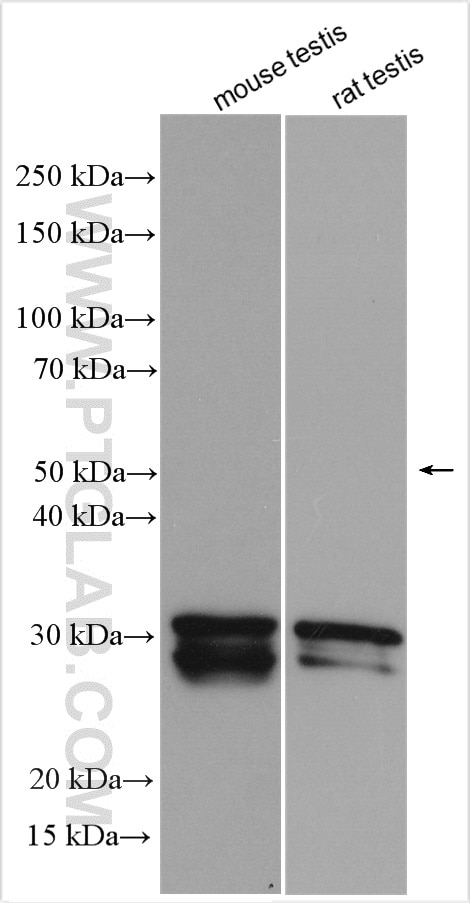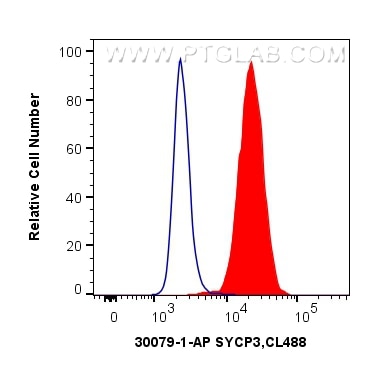SYCP3 Polyclonal antibody
SYCP3 Polyclonal Antibody for FC, WB, ELISA
Host / Isotype
Rabbit / IgG
Reactivity
Human, mouse, rat
Applications
WB, IF, FC, ELISA
Conjugate
Unconjugated
Cat no : 30079-1-AP
Synonyms
Validation Data Gallery
Tested Applications
| Positive WB detected in | mouse testis tissue, rat testis tissue |
| Positive FC detected in | Jurkat cells |
Recommended dilution
| Application | Dilution |
|---|---|
| Western Blot (WB) | WB : 1:500-1:3000 |
| Flow Cytometry (FC) | FC : 0.40 ug per 10^6 cells in a 100 µl suspension |
| Sample-dependent, check data in validation data gallery | |
Published Applications
| IF | See 1 publications below |
Product Information
30079-1-AP targets SYCP3 in WB, IF, FC, ELISA applications and shows reactivity with Human, mouse, rat samples.
| Tested Reactivity | Human, mouse, rat |
| Cited Reactivity | mouse |
| Host / Isotype | Rabbit / IgG |
| Class | Polyclonal |
| Type | Antibody |
| Immunogen | SYCP3 fusion protein Ag32466 相同性解析による交差性が予測される生物種 |
| Full Name | synaptonemal complex protein 3 |
| Calculated molecular weight | 236 aa, 28 kDa |
| GenBank accession number | BC062662 |
| Gene symbol | SYCP3 |
| Gene ID (NCBI) | 50511 |
| Conjugate | Unconjugated |
| Form | Liquid |
| Purification Method | Antigen affinity purification |
| Storage Buffer | PBS with 0.02% sodium azide and 50% glycerol pH 7.3. |
| Storage Conditions | Store at -20°C. Stable for one year after shipment. Aliquoting is unnecessary for -20oC storage. |
Background Information
SYCP3 is an essential structural component of the synaptonemal complex. This complex is involved in synapsis, recombination and segregation of meiotic chromosomes. SYCP3 is required for centromere pairing during meiosis in male germ cells. SYCP3 is also required for normal meiosis during spermatogenesis and male fertility. Mutations in SYCP3 are associated with azoospermia in males and susceptibility to pregnancy loss in females.
Protocols
| Product Specific Protocols | |
|---|---|
| WB protocol for SYCP3 antibody 30079-1-AP | Download protocol |
| FC protocol for SYCP3 antibody 30079-1-AP | Download protocol |
| Standard Protocols | |
|---|---|
| Click here to view our Standard Protocols |
Publications
| Species | Application | Title |
|---|---|---|
Elife Absence of CEP78 causes photoreceptor and sperm flagella impairments in mice and a human individual |



